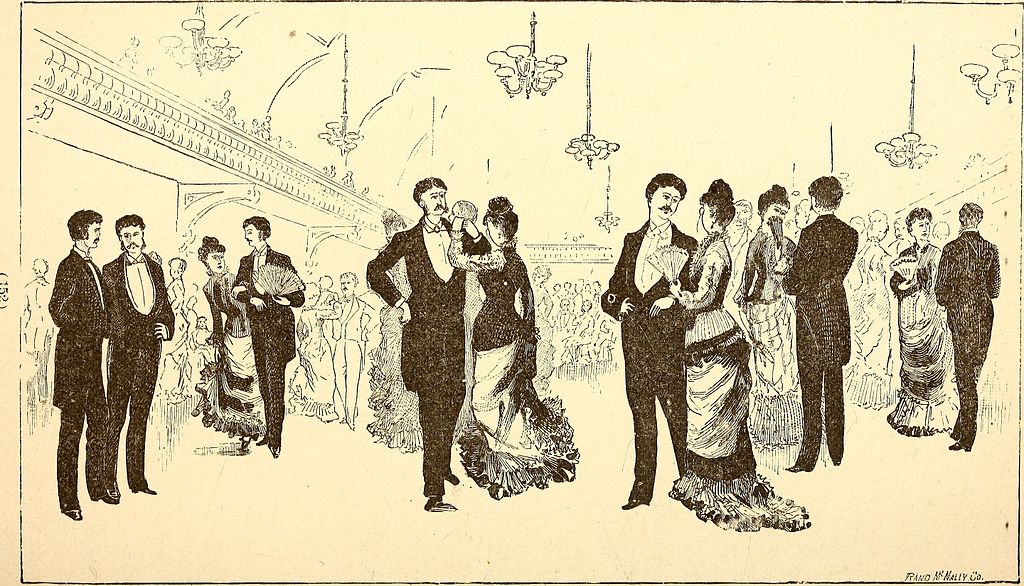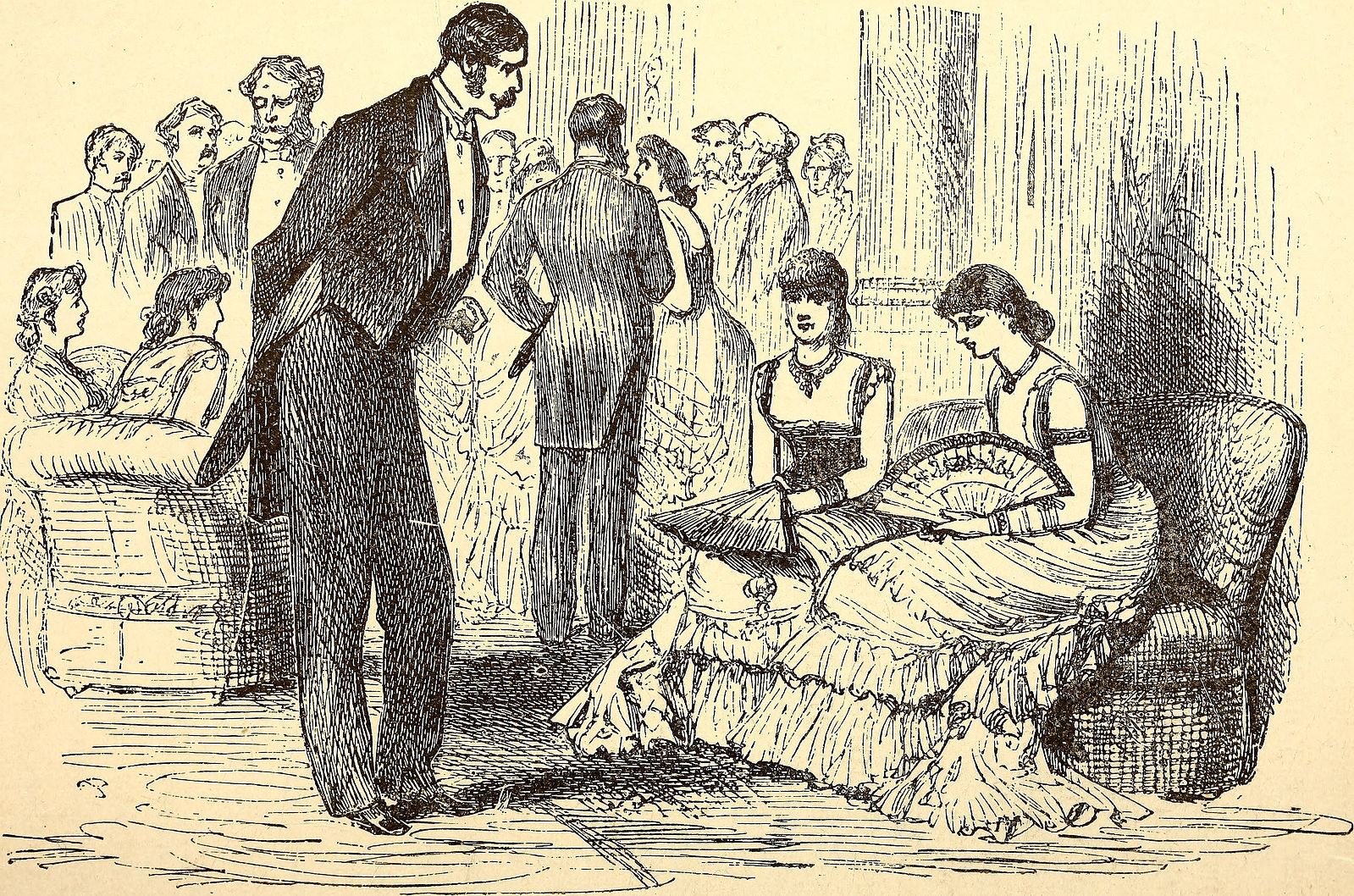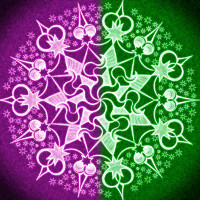It is impolite beyond measure to approach an elf upon the street, or indeed without formal indication, for such an action imposes your presence. If you seek to begin courtship, you may approach one of your aspiring paramour's siblings or friends to make discrete inquiries into their availability and preferences. If you are discouraged, do not press your suit nor make a nuisance of yourself, and rather accept the dismissal with grace and equanimity. It must be said that many proper friends will initially discourage a potential suitor, to test their reaction, for a true measure of an elf can only be taken in how they handle rejection.
If you are discouraged, you must desist, and return to wait for some indication. If no word comes, your aspiring paramour is utterly disinterested, and politeness demands that you not impose your presence upon them. Most often, though, a letter or bouquet of flowers will come, bearing with it a message. Traditionally, it is impolite to outright insult or invite a suitor, though this author has observed a tendency among the youth for more direct discourse. If the letter speaks about your virtues, but says that the writer is unsuited for you, or unfortunately cannot pursue a courtship at this time, then that is a rejection, and you should not continue to press your suit, though it is polite to send a letter in acknowledgement of the message. Flowers are the most traditional way of acceptance or rejection, being indirect, and if you have not been schooled in their language (as most youth have not), this author would recommend
The Lore of Flowers, by the distinguished Liodi Hakuri.
If you are encouraged, you must then wait for a social affair, which traditionally would be a ball or holiday celebration. In the modern era, it is appropriate too to wait for the reception to a grand speech or symposium, or any other large outing. You must then ask a mutual acquaintance for your aspiring paramour's permission to approach, then humbly must you permit that acquaintance to introduce both you and your suit. Upon introduction, your aspiring paramour will indicate acceptance or gentle rejection. Traditionally, acceptance is indicated by holding out a hand with a smile, shyness and uncertainty with hiding the face behind a fan, and rejection by holding the closed fan pointed down. If rejected, make the conservation short and topical to a mutual interest, then disengage and bother them not again. If the answer is acceptance or uncertainty, then the art of polite conversation must come into play, a topic far too broad for this nor any manual, though
The Art of Conversation and
Etiquette for the Modern Age, being a thorough guide to manners in today's society are both a place to start.
Modern sensibilities, being more direct, and the expressive fan having fallen out of style, might involve a more direct statement of interest, though so too might mood be conveyed solely through tone of voice, though a rather imprecise measure it might be.
Do not linger too long in conversation, for it is rude to monopolize another's time. The space of three dances is a proper and suitable time for making introductions, and indeed it is better to cut a conversation tantalizingly short than to let it run into boorish lengths.
The next day, send a letter or calling card, thanking the other for their attention and remarking upon your enjoyment of the evening. It is too early for declarations of infatuation or even mention of further plans, for you do not wish to burden the other with the weight of your expectation. A small gift is proper to be included, but must not be something that would expect reciprocation. A perishable or consumable, such as flowers, candies, or other small fancies, is ideal.
It is vital to maintain communication, though do not send multiple letters if you have had no reply, unless you have been informed that your sweetheart is unable to reply due to illness, misfortune, or distance, but would still wish to receive word from you. After three weeks of letters and an outing no more than once a week (for more often lends an undesirable pressure and feeling of rushing to a blossoming relationship), it is appropriate to begin indicating deeper feelings.
Earnest poems, flowers that symbolize deep affection, and more permanent - though still small - gifts become acceptable at this stage. A proper gift is something that indicates a knowledge of your paramour's preferences, and it is not only proper but indeed encouraged to seek the wisdom of their friends in choosing gifts. The cost of a gift should be commensurate with your income, and if you find yourself worrying about how to afford it, it is too grand a gift at this point. If your finances are tight, many appreciate homemade gifts, and indeed a poem written upon a scrap of paper or even recited orally can be held more dear to the heart than the stars in the sky.
After one year, it becomes appropriate to begin to grant larger gifts. The first date that a gift larger than a trinket should be given is the anniversary of your first meeting, and indeed recalling that date shows how dear it was in your heart. Which gift to give is entirely a matter of your paramour's preference and your own finances. A gift should certainly not bankrupt you, and it is improper to borrow money for the sake of a gift. If your finances cannot be manipulated even to afford a small book or similar curiosity, a gift of your own making, albeit preferably one that requires more effort than before, remains appropriate.
Do not go unchaperoned with your paramour at any point in this, nor ask to be apart from friends and family, for that is an unacceptable pressure. Indeed, until the relationship has proceeded for no less than three years, it is utterly inappropriate to seek to meet alone.
After three years of continued interest have elapsed, you or your paramour may breach the topic of further solemnity. If you are both now ready to put serious effort into the relationship, an exchange of promises is necessitated. It is the habit of the wealthy to commission a necklace, and of the middle and lower classes to request one that has been in the family. This author once heard the charming story of a machiner, who, having no fortune nor family, crafted a marvelous necklace out of scrap iron for her beloved, which while not of traditional forms is rather the work of art, having the earnestness of its making expressed in its rough shape.
After promises have been exchanged, it becomes appropriate to spend time alone. It is preferable to, especially at first, engage in something that provides a ready source of conversation, such as a long walk or drive through the countryside, or a visit to a museum of curios, for even the most skilled of tongues might find it difficult to maintain a proper conversation without external prompts.
The process by which a courtship may become a marriage is, unfortunately, beyond the scope of this manual, but it is this author's hope that this guide has laid out some of the ways by which a society elf might engage in that most ancient of traditions.















Very impressive. The tone of the entire article sounds like a very authentic code of conduct that could fit into a variety of real world ages. Did you base this on a real world code of conduct document? I would recommend adding some of the links in your article as article blocks in the side bar to expand it and make it more appealing. A simple digital drawing of the book or pamphlet cover for this code of conduct could also help fill up your sidebar and add even more authenticity ^-^
Thanks! Yeah, I read "Flower Lore," "The Gentleman's Book of Etiquette," and "The Ladies' Book of Etiquette" to figure out what tone I should be striking and what content makes sense to include. And that's a good idea! I was thinking of doing some of the "when this was published" and context type stuff, too, in the side bar, but ran out of steam
Well, it's not a race, so take all the time you need to polish your articles ^-^ I am glad I could provide some inspiration. And clearly, your sources are extremely well chosen. The tone you elected to use is so realistic, I can barely believe it's fantasy xD Good job!